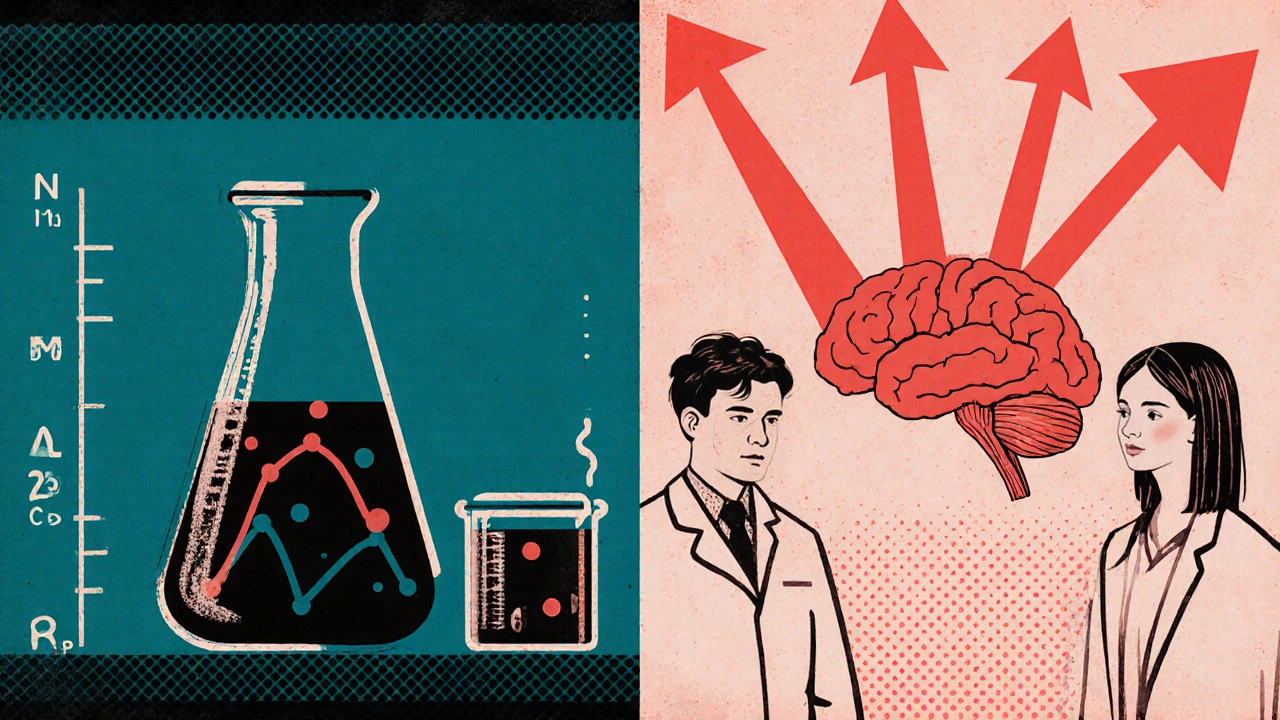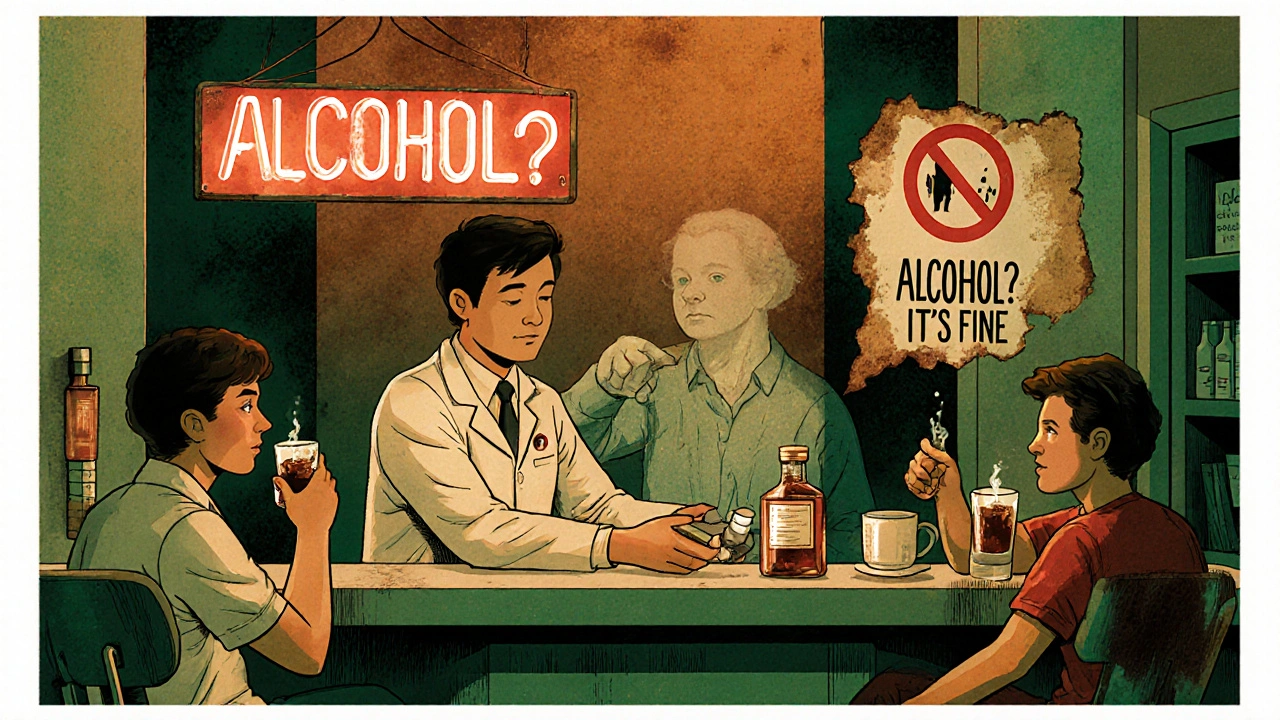Metronidazole Alcohol Safety Calculator
Is It Safe to Drink Alcohol While Taking Metronidazole?
Based on the latest scientific evidence, the traditional "disulfiram-like reaction" warning may be outdated. This calculator helps you understand your personal risk based on your situation.
For decades, doctors have told patients: don’t drink alcohol while taking metronidazole. The warning is everywhere - on pharmacy labels, in patient handouts, even in dental offices. The reason? A scary-sounding "disulfiram-like reaction" that’s supposed to cause flushing, nausea, vomiting, rapid heartbeat, and even dangerous drops in blood pressure. But what if that warning is based on a myth?
The Original Story: A 1964 Case That Changed Everything
The fear started with a single case report in 1964. A doctor named Saldivar noticed a patient taking metronidazole for a vaginal infection suddenly lost interest in alcohol. When the patient drank anyway, they got sick - flushed, nauseous, heart racing. Saldivar guessed metronidazole was blocking the body’s ability to break down alcohol, just like the drug disulfiram (Antabuse) does. Disulfiram, approved in 1951, works by shutting down an enzyme called aldehyde dehydrogenase (ALDH). Without ALDH, acetaldehyde - a toxic byproduct of alcohol - builds up in the blood. That buildup is what causes the awful symptoms. It’s a real, dangerous reaction. But is metronidazole doing the same thing?
The Science That Challenges the Warning
Here’s the problem: decades of clinical warnings didn’t match the science. In 2023, a major study published in the Wisconsin Medical Journal looked at over 1,000 emergency room patients who had both metronidazole and alcohol in their systems. They matched each patient with someone who had the same alcohol level, age, and sex - but didn’t take metronidazole. The results? Exactly the same rate of symptoms - 1.98% in both groups. That’s not a reaction. That’s just people getting sick from drinking alcohol.
Other studies confirm this. Twelve people were given metronidazole and then alcohol in a controlled setting. No one had a disulfiram-like reaction. Blood tests showed no increase in acetaldehyde - the key marker of a true disulfiram reaction. Animal studies found that while metronidazole might raise acetaldehyde in the gut, it doesn’t raise it in the bloodstream. And that’s what matters. A reaction you feel in your stomach isn’t the same as a systemic, life-threatening one.
What About Other Antibiotics?
Not all antibiotics are the same. Drugs like tinidazole (a close cousin of metronidazole), cefoperazone, and cefotetan do cause real disulfiram-like reactions. Studies show they spike acetaldehyde levels by 3 to 7 times. Patients taking these drugs get sick - often badly - if they drink. That’s not a myth. That’s proven science. But metronidazole? It doesn’t work that way.

The New Theory: It’s Not Acetaldehyde - It’s Serotonin
If metronidazole isn’t blocking ALDH, why do some people feel awful after drinking? A 2024 study from Greece offers a different explanation. Researchers found that metronidazole increases serotonin levels in the brain - by 250% in rats. Alcohol does the same. When you combine them, you might be triggering something closer to serotonin syndrome - a condition caused by too much serotonin in the nervous system. Symptoms? Nausea, flushing, dizziness, rapid heartbeat. Sounds familiar, right? That could explain why some people feel sick - not because of a liver enzyme issue, but because of a brain chemistry shift.
Why Do Doctors Still Warn Against It?
Even with strong evidence, the warning persists. Why? Fear. Tradition. Legal risk.
Most doctors were taught this in medical school in the 1980s or 90s. It’s ingrained. A 2023 survey found 89% of clinicians still tell patients to avoid alcohol, even when they know the evidence is weak. Why? They’re scared of being sued if someone gets sick. The FDA label still says to avoid alcohol. The Institute for Safe Medication Practices still lists it as a "possible" interaction. Hospitals and pharmacies follow the label - not the latest research.
And here’s the irony: this warning might be hurting patients more than helping them. People skip their metronidazole doses because they’re afraid to drink coffee with a splash of alcohol, or take a sip of wine at dinner. Others switch to more expensive or less effective antibiotics - costing the U.S. healthcare system an estimated $28 million a year. For someone with a serious infection like bacterial vaginosis or C. diff, delaying or avoiding metronidazole can be dangerous.

What Should You Actually Do?
Let’s cut through the noise.
- If you’re taking metronidazole: You don’t need to avoid alcohol to prevent a disulfiram-like reaction. The science says it’s extremely unlikely.
- But: Alcohol can make you feel worse if you’re already sick. It can worsen nausea, dizziness, or fatigue - common side effects of metronidazole anyway.
- If you have alcohol use disorder: Talk to your doctor. You might be better off on a different antibiotic like clindamycin. The goal is to treat your infection without triggering a relapse.
- Watch out for hidden alcohol: Some cough syrups, mouthwashes, and even certain foods contain alcohol. A 2019 case report described a 7-year-old who got sick after taking metronidazole and a cough syrup with 7% ethanol. That’s real risk - not from beer or wine, but from accidental exposure.
The Bottom Line
Metronidazole doesn’t cause a disulfiram-like reaction. Not in the way we’ve been told. The evidence is clear: no acetaldehyde buildup, no enzyme inhibition, no consistent pattern of reactions in controlled studies. What you might feel - nausea, flushing, dizziness - is more likely from alcohol alone, or possibly from serotonin effects in the brain. It’s not a drug interaction. It’s a coincidence mislabeled as a rule.
That doesn’t mean you should go out and binge drink while on metronidazole. You’re probably not feeling well. Alcohol isn’t helping. But if you have a glass of wine, a beer, or even a small cocktail? The risk isn’t what they told you. It’s far lower than you’ve been led to believe.
The real takeaway? Ask your doctor. Don’t assume the warning is based on solid science. Ask: "Is this reaction proven? Or is this just old advice?" The medical world is changing. You deserve to know the truth - not the myth.
Can I have one drink while taking metronidazole?
Yes - there’s no proven disulfiram-like reaction. Studies show no increase in toxic acetaldehyde levels when alcohol is consumed with metronidazole. However, alcohol can worsen common side effects like nausea or dizziness. If you’re feeling unwell from the infection or the medication, it’s smarter to skip it.
How long after metronidazole can I drink alcohol?
Metronidazole leaves your system in about 48 hours (5 half-lives). The old 72-hour rule is based on caution, not science. If you’re not experiencing side effects and feel well, you can drink after 48 hours. But if you’ve been drinking heavily or have liver issues, waiting a full 72 hours is still a safe choice.
Is metronidazole the only antibiotic that causes this reaction?
No. Tinidazole, cefoperazone, and cefotetan have proven disulfiram-like effects - they block ALDH and raise acetaldehyde levels. Metronidazole does not. If your doctor prescribes one of those, avoid alcohol completely. For metronidazole, the warning is outdated.
Why do pharmacies still warn against alcohol with metronidazole?
Because the FDA label still says to avoid it, and pharmacies follow the label to avoid legal risk. This warning has been taught for over 50 years. Changing long-standing medical practices takes time - even when the science is clear. Many doctors still believe the myth because they were never taught the newer evidence.
What should I do if I feel sick after drinking while on metronidazole?
Stop drinking and contact your doctor. While it’s unlikely to be a true disulfiram reaction, symptoms like rapid heartbeat, chest pain, confusion, or severe vomiting should be evaluated. You might be experiencing side effects from the medication, dehydration, or a serotonin-related response. Don’t assume it’s normal - get checked.
Are there any groups who should still avoid alcohol with metronidazole?
Yes. People with alcohol use disorder, liver disease, or those taking other medications that affect serotonin (like SSRIs) should talk to their doctor. Even if the reaction isn’t disulfiram-like, combining alcohol with metronidazole may increase side effects or risk of serotonin-related issues. Individual risk matters more than blanket rules.

Nicola Mari
November 29, 2025 AT 15:13
This is dangerous misinformation. People die from alcohol interactions with medications every year, and now you're telling folks to just sip wine like it's no big deal? The FDA label exists for a reason. If you're willing to gamble with your liver and your heart, that's your business-but don't pretend science has cleared this just because some small study didn't find a spike in acetaldehyde. My cousin had a seizure after drinking while on metronidazole. No one told her it was 'unlikely.' She's lucky to be alive.
Sam txf
December 1, 2025 AT 03:41
Oh wow. So now we're trusting some journal article over 60 years of clinical practice? You sound like one of those guys who thinks vaccines cause autism because a guy on YouTube said so. Metronidazole + alcohol = bad. Period. If you're too lazy to read the damn label, don't blame the system when you end up puking in an ER with your heart trying to escape your chest. I've seen it. It ain't pretty.
Aarti Ray
December 2, 2025 AT 14:00
I took metronidazole last year for a bad infection and had one beer after 48 hours and felt fine. My grandma in India always said if you feel okay you're okay. We don't overthink things here. But I did avoid mouthwash with alcohol and that's smart. Also my doctor never said no drinks just said 'maybe wait a bit.' Maybe the warning is more about culture than science.
Leah Doyle
December 2, 2025 AT 15:40
This is so refreshing to read. I’ve been terrified to drink coffee with a splash of rum in my chai since I started metronidazole. I’m so glad someone broke this down clearly. I had no idea serotonin could be involved-that makes so much sense. I feel less guilty now. Also, thank you for mentioning hidden alcohol in cough syrup. My kid got sick after that combo and we had no idea why.
Alexis Mendoza
December 2, 2025 AT 22:47
It’s interesting how medicine clings to old ideas even when the evidence changes. We’re taught to trust authority, but authority can be wrong. Maybe the real issue isn’t whether alcohol reacts with metronidazole-it’s whether we’re willing to admit our institutions are slow to change. We warn people out of fear, not facts. And that’s a bigger problem than any drug interaction.
jaya sreeraagam
December 3, 2025 AT 13:57
Thank you for writing this. As someone who’s been on metronidazole three times and never had a reaction even with a glass of wine, I’m so tired of being shamed for it. I work in healthcare and I’ve had to correct nurses who told patients they couldn’t even have a popsicle with alcohol flavor. The fear is real, but the science is clearer. Also, the serotonin angle? That’s brilliant. I’ve noticed I get really dizzy and flushed after drinking on this med-never the classic flushing of disulfiram, more like a warm buzz with nausea. That’s not a liver thing. That’s a brain thing. We need to reframe this. And yes, the $28 million waste? Real. People skip doses because they’re scared of a myth. That’s worse than any hangover.
Michael Segbawu
December 4, 2025 AT 18:54
So you're telling me the FDA is wrong? The AMA is wrong? All the pharmacists are wrong? You think you know better than every doctor who's seen someone turn purple and collapse? I'm from the US and we don't play around with our health. You want to be a guinea pig? Fine. But don't post this crap and make other people think it's safe. My uncle died from this. He had one beer. One. And now he's gone. You're not a scientist. You're a risk-taker with a blog.
Michelle N Allen
December 5, 2025 AT 00:37
So I read this whole thing and honestly I’m not sure what to believe. I mean I guess if you say the science says it’s fine then maybe it is. But I still don’t want to risk it. I’m just gonna wait the 72 hours like they said. It’s easier than thinking. Also I’m tired now so I’m gonna go nap. Maybe I’ll read it again later.
Alexander Rolsen
December 5, 2025 AT 23:37
Let me get this straight: you’re arguing that because a 2023 study found no statistical difference in ER visits between people who drank and didn’t drink while on metronidazole, it’s therefore safe? That’s a classic ecological fallacy. You’re conflating population-level data with individual risk. One person can still have a catastrophic reaction even if the odds are low. And serotonin? That’s a hypothesis. A hypothesis that hasn’t been replicated in humans. You’re cherry-picking data to justify your desire to drink. Meanwhile, the FDA, WHO, and every major hospital system still say no. Why? Because they don’t trust the data enough to change policy. And neither should you.